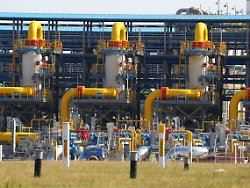Saturday 23 October 2021
Rise in energy prices
Ukraine offers more gas to Europeans
55 billion cubic meters: this is how much gas is supposed to flow through Nord Stream 2 to Europe every year. The biggest opponent of the Baltic Sea pipeline is now making a counter offer. Ukraine offers to deliver the same amount in addition. Meanwhile, the EU is concerned about the steep rise in gas prices.
Against the background of the sharp rise in energy prices, Kiev has offered Europeans a significant increase in gas supplies. Ukraine’s Security and Defense Council chairman Oleksiy Danylov told journalists that Kiev currently has a contract with Russia that provides for 40 billion cubic meters of gas in transit. “But today we can offer our European friends an additional 55 billion cubic meters of gas.”
Danylow did not provide any more specific information about the offer. 55 billion cubic meters correspond to the annual capacity of the recently completed Nord Stream 2 Baltic Sea pipeline. Ukraine is one of the vehement opponents of the German-Russian pipeline, which Moscow believes is a “dangerous geopolitical weapon”.
Nord Stream 2 is currently still going through the certification process at the Federal Network Agency, only then can it start commercial operations. Ukraine, but also representatives of Western states, accuse Russia of deliberately reducing its gas supplies in order to exert political pressure and accelerate the commissioning of Nord Stream 2.
Ukrainian President Volodymyr Zelensky accused Russia of “gas aggression” against Europe. “We are witnessing an artificial crisis that has a clear goal: to force Europe to give up its values,” said Zelenskyi. There will only be a return to more moderate energy prices if European governments respond in a “coordinated” manner to the “blackmail” maneuvers from Moscow. His country could also play an important role in this. “Ukraine has something to offer its European partners,” he stressed.
Nuclear power as a green energy source?
The current gas price crisis has also fueled the debate in the EU about the role of nuclear energy on the road to climate neutrality. France in particular insists on expanding nuclear power in Europe as part of the fight against climate change. The French Minister of Economic Affairs and Finance Bruno Le Maire and several EU colleagues launched a public appeal in mid-October.
EU Commission chief Ursula von der Leyen said after the end of an EU summit on Friday that it was “obvious” that the EU needed “more renewable and clean energy”. However, in addition to renewables, the EU needs a “stable” source of energy, namely nuclear energy, as well as natural gas “during the transition” to climate neutrality. By the end of the year, the EU Commission must present a classification system for energies that it classifies as sustainable – the so-called green taxonomy. Whether nuclear power and gas should be classified as green energy sources is highly controversial in the EU.
An EU diplomat said “a large majority of member states” want both nuclear and gas on that list. Several countries, including Germany, Austria and Luxembourg, vehemently reject the classification of atomic energy as sustainable, with reference to the radioactive waste generated in the process.
Dependence on Russia
Von der Leyen also referred to renewable energies as a way of giving the EU a great deal of “independence” in the energy sector. According to critics of Nord Stream 2, the pipeline increases the dependence of Europeans on Russian energy.
Zelenskyi recalled that Russia had in the past suspended gas supplies to his country and demanded concessions “that harm Ukraine’s national interests”. Now it is up to Europe “to familiarize itself with the concept of gas war”.
The parliament of Moldova, located between Ukraine and Romania, declared a 30-day state of emergency in response to Russian gas price increases. Prime Minister Natalia Gavrilita announced that, in view of the “critical situation”, she would ask EU countries for gas supplies.
